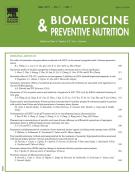Taxifolin ameliorates 1,2-dimethylhydrazine induced cell proliferation and redox avulsions in mice colon carcinogenesis - 23/10/14

Abstract |
New strategies for the prevention of colon cancer persists a crucial need. However, resistance to current chemopreventive drugs is relatively prevalent in colon carcinogenesis. For this intent, a chemopreventive study was acquitted to elucidate the probable effect of taxifolin (TAX) against 1,2-dimethylhydrazine (DMH) induced colon carcinogenesis in mice and to evaluate its efficacy with 5-fluorouracil (5-FU) drug control. Swiss Albino mice were intended for colon carcinogenesis received subcutaneous injections of DMH (20mg/kg bw., sc) once a week for 15 weeks and were treated with TAX (4μg/kg bw, op) and 5-FU drug control (10mg/kg bw., op) for the entire study period. Our results unveil that mice administered with TAX significantly modulates DMH induced histological alterations (ACF, AgNORs, and mucin depletion). Moreover, TAX treatment also inhibits DMH mediated oxidative damage by diminishing tissue lipid peroxidation (MDA, MPO and CD) accompanied by enhanced activities of enhanced activities of free radical metabolizing enzymes (SOD, CAT, GPx, GR, GSH, vitamin A, C and E). Apoptotic and proliferating cell nuclear antigen (PCNA) findings also revealed that treatment with TAX substantially regulates cell proliferation through the increased extent of DNA fragmentation. The incidence of colon cancer in TAX treated mice was significantly reduced when compared to that of 5-FU control. Our findings concluded that taxifolin act as an effective chemopreventive agent against colon carcinogenesis by its virtue of antioxidant mediated apoptosis and anti-proliferative activities.
Le texte complet de cet article est disponible en PDF.Keywords : Taxifolin, Colon cancer, DMH, ACF, PCNA, Oxidative stress, DNA damage
Plan
Vol 4 - N° 4
P. 499-509 - octobre 2014 Retour au numéroBienvenue sur EM-consulte, la référence des professionnels de santé.
L’accès au texte intégral de cet article nécessite un abonnement.
Déjà abonné à cette revue ?

